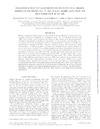Identificador persistente para citar o vincular este elemento:
https://accedacris.ulpgc.es/jspui/handle/10553/11397
| Título: | Colonization of gastropods on subtidal reefs depends on density in adjacent habitats, not on disturbance regime | Autores/as: | Tuya, F. Wernberg, T. Thomsen, Mads S. |
Clasificación UNESCO: | 241705 Biología marina 240106 Ecología animal |
Palabras clave: | Benthic Assemblages Mobile Epifauna Community Scale Recruitment, et al. |
Fecha de publicación: | 2009 | Publicación seriada: | Journal of Molluscan Studies | Resumen: | Habitats dominated by algal canopies are often altered by physical disturbances of varying severity, changing environmental conditions and biological processes. We used Artificial Seaweed Units (ASUs) to test whether severity of physical disturbances on algal canopies affects the post-disturbance colonization of gastropods on subtidal reefs. Specifically, we examined patterns of assemblage structure of gastropods to test the hypothesis that the extent and intensity of canopy removal affects the post-disturbance colonization of ASUs, testing the consistency of these effects among four regions encompassing a 68 latitudinal gradient in southwestern Australia. Because adjacent habitats can act as a source of new colonists (either as drifting migrants or as a source of propagules) from the perimeter surrounding perturbed areas, we also predicted that patterns of colonization (types and total abundances of colonizers) were influenced by the available pool of individuals at the scale of reefs. Three reefs were selected within each region. On each reef, ASUs were placed in the centre of circular canopy clearings of different size (0, 3, 13 and 50 m2) and intensity (50% vs 100%), and retrieved after 3 months. Resulting assemblages occupying the ASUs were quantitatively representative of the adjacent (undisturbed), algal-associated, assemblages at the scale of reef. Within reefs, recruited assemblages largely mimicked those associated with erect red algae. However, neither disturbance size nor intensity affected the colonization patterns across reefs and regions. These results suggest that algal-associated gastropods, regardless of the prevalent mode of dispersion, are resilient to physical disturbances to canopies across broad geographical regions as long as the pool of potential colonists is maintained. A high dispersal ability of gastropods likely ensures a quick colonization of recovering algal habitats. | URI: | https://accedacris.ulpgc.es/handle/10553/11397 | ISSN: | 0260-1230 | DOI: | 10.1093/mollus/eyn032 | Fuente: | Journal of Molluscan Studies [ISSN 0260-1230],v. 75 (1), p. 27-33, (Febrero 2009) | Derechos: | by-nc-nd |
| Colección: | Artículos |
Citas SCOPUSTM
18
actualizado el 08-jun-2025
Citas de WEB OF SCIENCETM
Citations
18
actualizado el 08-feb-2026
Visitas
317
actualizado el 15-ene-2026
Descargas
242
actualizado el 15-ene-2026
Google ScholarTM
Verifica
Altmetric
Comparte
Exporta metadatos
Los elementos en ULPGC accedaCRIS están protegidos por derechos de autor con todos los derechos reservados, a menos que se indique lo contrario.
